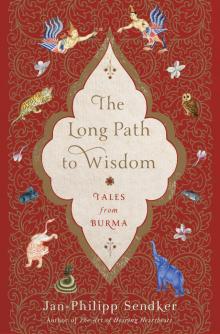- Home
- Jan-Philipp Sendker
The Long Path to Wisdom Page 7
The Long Path to Wisdom Read online
Page 7
“I am sorry,” replied the fearful young man in a weak voice. “What was I supposed to do? I am journeying to seek a famous astrologer and the path to him leads right through your kingdom. I humbly beg your forgiveness.”
The king was on the verge of answering that he knew no mercy and that the intruder was to be executed at dawn when the soft voice of the princess rang through the room. “Stranger, you say that you are on your way to a famous astrologer. Please ask him for me what my future holds.” The king could not believe his ears. Since her birth his daughter had not spoken a word, and all believed her to be deaf and dumb. Could he really condemn the man to whom his daughter had spoken her first words? And who would ask the astrologer about the princess if the foreigner’s journey ended here? He decided to pardon the young man on the condition that he return to the castle to relay the stargazer’s prophecy.
Relieved, the young man promised to do just that and continued on his way.
After a long journey he finally reached the hut of the famed astrologer. In front of the hut waited a long line of people who, like him, had traveled great distances. Patiently, the weary young man waited for his turn.
Inside the hut, amid candles, books, and papers, there sat an old man. The mere sight of him evoked such reverence in the sick man that he scarcely dared open his mouth.
“I am very sick,” he finally explained quietly. “My parents have tried to nurse me back to health. They cared for me and called on every healer they could find, but no one could help me. This is why I would like to know my future. Am I to die soon?”
For a long time the astrologer said nothing. At last he replied, “If you had not undertaken the journey to see me, then you would indeed have died. Now that you have accomplished that feat, you will also manage to get over your illness. You will become a rich and happy man.”
Relieved and elated, the young man thanked him. He already felt somewhat better and wanted to rise when he suddenly remembered his promises. But should he really take up even more of the astrologer’s precious time? Did he not already have the information he sought? He hesitated. “Honored master,” he ventured after a long pause, “May I ask something else in the name of all the friends I met along my way?”
The astrologer nodded.
“The daughter of the king whose kingdom I crossed is already sixteen years old yet does not speak a word. Will this ever change?”
“Oh!” laughed the old and wise man. “That is an easy question. The king must allow his daughter to marry the first man to whom she speaks. From then on she will have no trouble speaking.”
“On the way I met a crocodile who asked me to seek your advice because he cannot dive under the water.”
“For that, too, there is a solution,” the astrologer replied. “There is a magical stone stuck in its head. Once that stone is removed, the animal will be able to swim under the water.”
The young man felt the exhaustion from his long journey throughout his whole body, and he wanted nothing more than to lie down and rest, but there were two more promises he did not want to break. And so he told about the snake and asked for advice on her behalf.
“She does not know this, but she is guarding a large ruby. The gem is hidden under the hill. Dig it up and she will be able to slither away wherever she pleases.”
Lastly, the young man told of the nat in the banyan tree.
The astrologer had a solution for this problem, too. “Under the tree lies a pot of gold that the spirit is protecting. As soon as the gold is excavated, the spirit may go free.”
The thankful young man took his leave and gathered his strength for the long and difficult journey back. After a few days, as the astrologer had predicted, he felt a bit better and set out on his way.
His long return journey finally brought him to the palace, where the king could barely contain his excitement. “Tell me then, traveler, what did the astrologer say?”
The young man repeated the recommendation word for word.
Recalling that his daughter’s first words had been to the stranger and trusting in the power of the stars, the king granted the stranger his daughter’s hand in marriage. From then on she spoke and conversed as if there had never been a problem.
Her husband, now a prince, wanted to take his bride with him to his village in order to introduce her to his mother and father, and the two began their long journey the very next day.
That evening they reached the large river, where they found the unhappy crocodile lying on the bank watching the others dive below the surface.
“Did you keep your word and ask the astrologer about me?” he wanted to know immediately.
“Of course,” replied the young man, who was now feeling fit as a fiddle. He recounted the astrologer’s words. The crocodile had, in fact, always noticed a certain pressure under his scalp and when the princess inspected the area closely, she found a slight bump. Using a small knife, she made a little incision over the bump and out fell a large gem that sparkled brilliantly when it caught the sun’s light. Out of gratitude, the crocodile transported the two to the opposite side of the river and gave the precious stone to the prince. He was so pleased that he also told them about a shortcut they could take on the way back to their village. The prince was not interested in this advice, however, as he was still beholden to two other friends.
The prince and princess trekked on until they met the snake, still sadly slithering around her hill. The prince relayed the astrologer’s wisdom, and with the snake’s permission, they began to dig. After a short while, they found a ruby so large, even the princess had never seen the like of it at her father’s court. The snake felt a great relief and knew that she was now free. “Keep the ruby!” she called to them as she disappeared into the bushes, never to be seen again.
At last they reached the banyan tree. The prince went up close to the trunk and told the tree what he had heard from the astrologer. For a long time he heard nothing except for the rustling of the leaves in the wind.
“The pot of gold,” came the spirit’s voice suddenly, “is under the roots that point to the west. Dig it up and take it so that I can finally be free.”
The prince and princess did as they were told and traveled on until they reached the village. From that day forward, the young man remained not only healthy, but also wealthy and happy in the companionship of his wife.
When the Buddha still lived and wandered the world spreading his teachings, he had a student named Ananda, a man filled with gratitude, generosity, and serenity. Together they traveled to an unknown region where the Buddha sent Ananda ahead to the palace to meet with the king. The king was extremely wealthy, and as it happened, Ananda arrived at the palace just as a shipment of a thousand robes arrived from abroad. The king immediately distributed half of these luxurious garments among his many wives.
It was not long before many of the palace residents, including the king’s wives, showed great interest in what Ananda had to say. To pay him homage, they gave him their robes and declared their intentions to live more in accordance with his teachings. A short time later the king threw a grand party and bade his wives wear their new robes. They were unable to comply with his request, however, because they had already given their costly robes to Ananda!
When the king learned of this he was furious with the preacher, who had not only been living under his roof, but had also enriched himself at the king’s expense. He called Ananda before him in order to take him to task.
“I have heard that the Buddha requires modesty and that one should own no more than three robes for daily use,” he cried angrily. “Yet you have accepted five hundred robes as presents!”
Ananda smiled. “You are right,” he answered. “But my master does not say how many donations we are allowed to receive.” He led the king to his simple quarters. “The robe is used first as an outer garment and later as an undergarment once it begins to wear,” he explained. “Next
we use it for bedding and then as a rug,” Ananda continued. “When it becomes too filthy even for that we can always use it to wipe our feet when we come inside. Finally, we tear the cloth into strips, mix those with clay, and then use the material to build walls.” The king was deeply impressed and gave all the remaining robes to Ananda, the Buddha, and his followers.
Ananda then gave one of these robes to a student as a symbol of his gratitude for the student’s help with his daily chores, including the cooking and cleaning. In turn, this student selflessly passed the robe along to a friend. The costly garment drew the attention of the Buddha’s followers, who became upset and complained to the Buddha that Ananda clearly favored certain individuals who had now amassed such great riches that they were giving precious goods away.
A smile flashed over the Buddha’s face. Ananda had simply understood the deeper meaning of gratitude and respect, he explained.
In order to illustrate the meaning of gratitude and modesty, he told the following story:
There was once a lion that lived with his family on top of a mountain surrounded by a forest and various rivers and lakes. Around the mountain lived Cat, Hare, Deer, and Fox. Hare and Deer were grazing peacefully by one of the rivers when Lion, on a hunt, sprang down from the mountain with a mighty leap. The other animals fled in fear, but the lion soon realized that his paws were stuck in the mud he had landed in. The hot sun rapidly dried the wet earth and now Lion was trapped.
For seven days, Lion languished there until he was starving and weak. At last he saw Fox passing by in the distance.
“Fox, help me! I’m stuck!” cried Lion desperately.
Reluctantly, Fox came nearer. “If I free you,” he said hesitantly, “how do I know that you won’t eat me?”
“No, no, I would never do that,” promised the lion, gasping for breath. “I am terribly exhausted; I can hardly stay on my feet. Oh please! Save me! I would be forever grateful!”
Fox decided to help and started digging away at the dirt around the lion’s paws. He was able to soften the mud with water, and in the end he pulled the lion free.
Lion proved his gratitude by killing a buffalo for Fox, and even though it went against his nature, he also held back and waited until Fox had eaten his fill before helping himself to the leftovers. Finally, taking a large piece of meat in his jaws, Fox prepared to take his leave.
Lion, however, still felt deeply indebted to Fox and proposed the following: Would Fox perhaps like to come live with the lions in their spacious cave on top of the mountain where there was always enough to eat? Fox accepted the offer, and starting the very next day, the two families lived together in the great cave, sharing all their food and hunting together.
After a while the lioness started to feel that Lion was paying more attention to the foxes than to his own sons. She said to the vixen: “You all have lived with us for quite some time now. It’s getting a little cramped, don’t you think? Wouldn’t it be nice to be back in your own den?” The young lions made similar comments, and the foxes, sensing that they were no longer welcome, prepared to move out. Before they left, however, Fox wanted to hear what the father lion thought about the matter.
When Lion heard what had happened he was indignant. He gathered his family together and explained insistently: “I lay there dying of thirst in the sun when Fox, in spite of the danger to himself, saved my life. Every one of us is greatly indebted to him, and we must all be thankful. Besides, when has there ever been a time limit on gratitude?”
The lioness and the children nodded. They understood, and from then on the lion and fox families lived peacefully together in the cave.
A father and his son wanted to go on a journey, so the father sent the son to the barn to fetch the donkey to carry their packs. When the donkey had been laden, they felt sorry for the poor animal on account of its heavy load, so they decided not to ride on it but to walk beside it.
They set off and soon came to the first village. Immediately they noticed the stares of the villagers. Why weren’t they riding their donkey, the villagers scoffed. What a waste! When the father and son heard this, they decided that the son should ride the donkey, because, after all, the people had a point.
They traveled on in this manner and soon reached the next village. This time the villagers were downright angry—how disrespectful it was for the son to not let his father ride the donkey but to hog it for himself! Naturally, the son did not want to appear disrespectful, so he quickly jumped down and helped his father up into the saddle.
Hoping that they had now done everything right, the two continued on their way. The path rose to a steep incline and while the father was able to ride in comfort, the son began to sweat profusely beside him. On top of the mountain they discovered a small settlement, and the son rushed into it for a drink of water. When the locals came out of their huts to greet the visitors, they were appalled to see the son so exhausted while the father was still fit as a fiddle. What kind of a terrible, selfish father was this? They told him to get out and never come back.
Confused, the father and son stood at the edge of the village. They only had one option left, so they both mounted the brave little donkey.
After a while they reached another village. As the father and his son rode through on their panting pack animal, the villagers stared at them. Two people riding on this poor, abused, half-dead donkey! What shameful behavior! What kind of coldhearted brutal individuals these strangers must be!
Immediately, father and son dismounted and left the village as quickly as they could. As soon as they were out of sight, they stopped to catch their breath. After a while the son turned to his father and asked, perplexed: “So now what do we do?”
Once there were two farmers living in a small village where the calving season had just begun. One of the two neighbors was known for his cleverness. He owned a cow that was on the verge of giving birth. The other neighbor, generally regarded as a bit simple, owned a horse that was about to foal, and he was very pleased because on a farm horses had great value as work animals.
One night after both of the neighbors had gone to bed, the clever farmer’s cow and the simple farmer’s mare both went into labor. Now it was widely known that the clever farmer suffered from insomnia. He rarely slept soundly, so he woke the minute the noise began. Hearing both the pitiful lowing of the calf and the vigorous whinnies of the foal, he correctly concluded that both his cow and his neighbor’s mare had brought their offspring into the world.
It being still the middle of the night with the moon barely visible in the sky, the scheming neighbor lit a torch and hurried along the path to the place where the animals were kept. He went first to his cow’s stable and checked on the healthy little calf by the light of the torch. He saw no light in the nearby stall where the horse was stabled and supposed that his neighbor, a deep sleeper, had not been woken by the din, so he decided to take a quick look for himself. He could make out the contours of a handsome colt lying peacefully in the straw. Since there was no sign of his neighbor, the sly farmer decided to seize this golden opportunity. He returned to his own stable, took the calf in his arms, and carried it to the neighbor’s stable, where he laid it snugly beside the mare. Then he took the colt and carried it to his own stable, where he left it in the care of the cow. Satisfied with this deceit, he returned to his bed to rest a few more hours.
He knew, however, that news of the unusual birth needed to make the rounds before his simple neighbor had a chance to put two and two together. And so despite his lack of sleep, the clever farmer was out and about very early telling everyone he met in the village of the miraculous incident in his stable. Many incredulous villagers put aside their morning chores to get a glimpse of the cow that had borne a foal. As the sly neighbor had anticipated, these villagers were then willing to testify to the marvelous event. Right there in the humble thatched shelter there truly was a big cow with a little foal nestled into the warm coat of her heavy
body. The awestruck villagers beheld the animals in amazement, but their reverent silence was abruptly shattered when the simple farmer arrived to accuse the clever farmer of having stolen his foal.
The sly farmer tried to ease tempers by explaining to his simple neighbor that it must just be a quirk of nature that a cow brought a foal into the world. Not persuaded in the least, the simple neighbor objected that the story would be more credible if a calf had not been found beside a mare the very same morning. It was not a case of some extraordinary miracle, but rather an underhanded swap of the two newborn animals. The conniving neighbor tried to paint it all as remarkable coincidence: two unnatural events that just happened to occur on the same night. This explanation in no way convinced the simple neighbor, and so he called on the villagers to help him win back the foal that was rightfully his.
The villagers had no idea what to do. None of them knew the details of what had transpired, so it was just one neighbor’s word against the other’s, and they were hesitant to take sides. They told the two farmers they would have to find some other means of settling their dispute. Since the villagers were clearly unwilling to get involved, the simple neighbor decided to seek the help of an outsider to mediate the absurd situation. Unfortunately their village was so small that there were no higher authorities one could turn to in cases like this. The owner of the horse therefore insisted that the owner of the cow go with him to the neighboring village to find an impartial judge. They set out at once.
On the way the two farmers met a hare, and because they knew that hares had the reputation of being just, they asked if he would be willing to arbitrate for them. The hare asked them to lay out the details of the case, and after listening carefully he agreed to resolve the matter for them. Apparently the hare was widely known and much in demand in these parts, however. He told them that he had no time to devote to the case today, but that he would be willing to meet again with both parties in a week’s time. The official hearing would take place in their village. Furthermore, all evidence and all witnesses in the case must be present or readily available. Above all, the session must start promptly, first thing in the morning, as soon as the sun appeared on the horizon.

 The Language of Solitude
The Language of Solitude A Well-Tempered Heart
A Well-Tempered Heart The Art of Hearing Heartbeats
The Art of Hearing Heartbeats The Far Side of the Night
The Far Side of the Night Whispering Shadows
Whispering Shadows Dragon Games
Dragon Games The Long Path to Wisdom
The Long Path to Wisdom